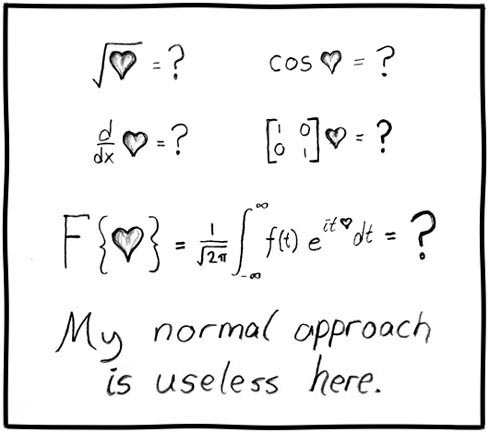
Describes relationships for most of us anyway.
Romantics and poets have spent considerable amounts of time trying to quantify love over the past several centuries with very limited success. Scientists including Johannes Kepler (more famous for discovering law of planetary motion) even devised the Marriage (Secretary) Problem, a method using interviewing methods and analytics for increasing optimizing finding a mate.
More recently, dating applications are doing the job of trying to optimize dating outcomes through big data and analytics, and why not? With over 53% of enterprises now applying big data techniques into their strategic initiatives, now is as good a time as any to understand how taking the logical route can help you find “the one”, especially as we approach another Valentine’s Day.
Here is a sample of what we found online:
- OK Cupid Focuses on Preferences: One of the more amusing reads online today is dating site OK Cupid’s blog, consisting of trends that describe everything from racial preferences to the mathematics of beauty to the best first date questions. The gathering of such these analytics are simple, originating from the thousands of available questions that users answer to sum up into a match percentage with another individual. In essence, the more questions someone asks, the better matches they will receive.
- What You Say Does Matter: In the digital age, love extends to social media and text messages, presenting pattern-based possibilities that allow for the understanding of relationships. According to scientists, the usage of certain words offer a glimpse into everything, including attachment styles, emotional availability, and happiness. Couples that text the word “we” for example, tend to be happier. Down the line perhaps, messaging applications might leverage this data to offer greater context in social situations, including proposed date night activities and remembered anniversaries.
- eHarmony Automates Calculations: eHarmony is famous for its multi-dimensional compatibilities, and there is a science behind it. New users answer nearly 400 questions around traits, interests, hobbies, and more, triggering an Oracle 10G database to suggest matches. Behind the scenes, an algorithm runs nearly a billion calculations to offer detailed matches on a 4-terabyte dataset – not including photos. Of course, only the right matches will emerge if the human answering the questions on the front-end answers honestly.
- You Can Understand Yourself: Finally, one user thought they would understand how big data worked in their dating life and asked Tinder for their information, receiving a report numbering over 800 pages. She noticed that the dating platform recorded everything, including all the jokes she shared, the matches she ignored, and the external applications she connected. Tinder’s explanation for all this data is their work at personalizing the dating experience and uncovering the preferences of its users. Privacy challenges aside, this type of data enables the company to build a better application and offer better matches.
So what do all of these findings suggest? With more data than ever, there are theoretically higher odds to finding the love of our life and the platforms that exist out there are seeing to that outcome through advanced algorithms, text-based analysis, and large databases. As digital transformation further evolves in the coming quarters, we expect dating to transform even further into areas including the Internet of Things (IoT), robotic automation, and virtual/augmented reality. In essence, the possibilities are endless.
However, in the same vein, the emergence and application of big data also does not replace the work of dating. We still need to have the conversations, feel the butterflies in our stomachs, and express giddiness at the potential of love with big data accelerating such conversations. Thus, it is important to remind ourselves that technology supplements, but does not replace.
Have a great Valentine’s Day!
Learn More
Are you interested in leveraging big data in your organization to understand your customers? Discover our work and speak to a specialist at www.perficient.com today.

